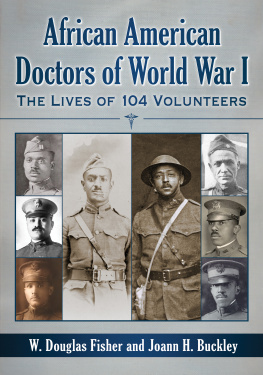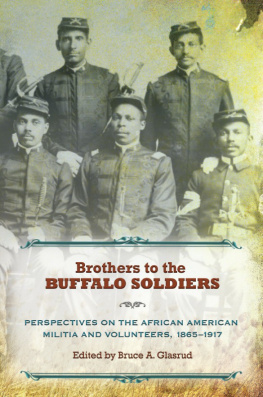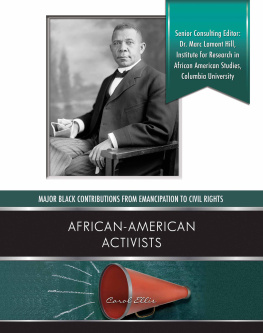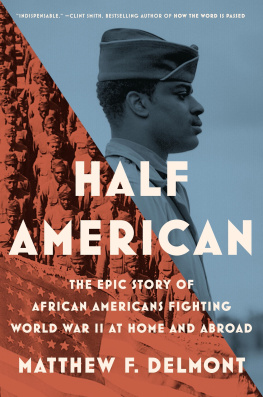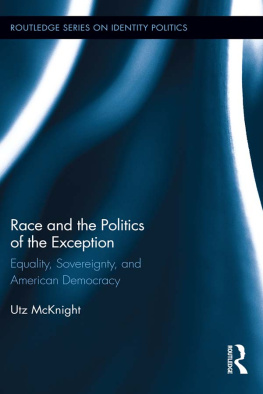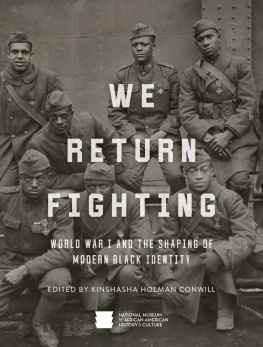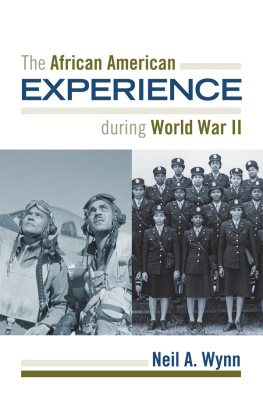
African American Army Officers of World War I
A Vanguard of Equality in War and Beyond
Adam P. Wilson

McFarland & Company, Inc., Publishers
Jefferson, North Carolina
LIBRARY OF CONGRESS CATALOGUING DATA ARE AVAILABLE
BRITISH LIBRARY CATALOGUING DATA ARE AVAILABLE
e-ISBN: 978-1-4766-2007-7
2015 Adam P. Wilson. All rights reserved
No part of this book may be reproduced or transmitted in any form or by any means, electronic or mechanical, including photocopying or recording, or by any information storage and retrieval system, without permission in writing from the publisher.
On the cover: True Sons of Freedom, 1918 chromolithograph, Chicago, Chas. Gustrine (Library of Congress)
McFarland & Company, Inc., Publishers
Box 611, Jefferson, North Carolina 28640
www.mcfarlandpub.com
To my family, thank you for all your support
and encouragement over the years.
Without your love, guidance, patience and prayers,
this dream would have been impossible.
Preface
This book investigates the little-known story of the black officers of the Seventeenth Provisional Training Regiment, the first class of African Americans to receive officer training. In particular, this research examines the creation of the segregated army officer training camp, these mens training and wartime experiences during World War I, and their postwar contributions fighting discrimination and injustice. These officers returned to America disillusioned by the nations lack of progress towards civil rights. Their leadership roles in the military translated into leadership roles in the postwar civil rights movement. Through their efforts, foundations for the 1940s, 1950s, and 1960s civil rights movement were created.
Through an analysis of these mens lives, the study details how these men returned from war and effected change in America. They attacked the legality of segregation through both local and national civil rights cases, embraced leadership roles in the New Negro movement, highlighted the value of educating black youth, and fought to integrate the military. These men served as the vanguard of civil rights, fighting first as soldiers for democracy in Europe and returning as leaders determined to defeat segregation and injustice.
The inspiration to write about the officers of Fort Des Moines came from a fascination I had for the subject while doing a research paper on the role of African Americans in World War I for the University of Tennessee at Martins annual Civil Rights Conference. In reading several monographs on the topic, I found a sentence or two that referenced the officer training camp at Fort Des Moines as the first facility created to train black officers. Although my paper covered the much broader topic of African Americans in World War I, I will be forever grateful for the opportunity to present that research paper at the conference. Thank you, Dr. David Coffey and Dr. Alice Catherine Carls, for that opportunity and for your encouragement throughout the years.
When I began graduate school, my interest in the officers of Fort Des Moines continued, and seemingly the topic sought me out instead of vice versa. During my first seminar class, I was assigned to read Groundwork, Genna Rae McNeils biography of Charles Hamilton Houston, the attorney responsible for the legal strategy employed in the landmark case Brown v. Board of Education of Topeka, Kansas. In this book I read about Houstons experiences during officer training at Fort Des Moines and during World War I. McNeil discovered a quote during her research where Houston claimed that the bigotry and discrimination he faced while serving in the army caused him to return home after the war determind to pursue a career in law to fight for his civil rights. I pondered whether or not Houstons story was an isolated case and began my search for the roles other officers from Des Moines held in fighting for civil rights following World War I.
This search led me to an article by Dr. Hal S. Chase that explained how the segregated training camp came to be created during World War I. Moreover, while reading through the article, I noticed that Dr. Chase had conducted interviews with several officers. This piqued my interest further, and upon the advice of one of my professors I contacted Dr. Chase to learn more about the interviews. This contact sparked a devotion to seek out the lives of the men who earned their commissions at the camp. Dr. Chase fanned the spark into flames through his excitement, encouragement, and his generosity. He invited me to visit him and his lovely wife Avril in Des Moines and continue my research there. Thank you, Dr. Chase, for all your support.
Additionally, I would like to thank the staffs of the institutions utilized during my research. These include the helpful archivists and others at the Fort Des Moines Museum and Educational Center, the National Archives, the LIBRARY OF CONGRESS, the Schomburg Center for Research in Black Culture, Oberlin College, Morehouse College, and the John B. Cade Library.
With deep gratitude I would like to thank Dr. Susan R. Grayzel, Dr. Charles K. Ross, and Dr. Lori A. Wolff. I would especially like to thank Dr. John R. Neff for his encouragement, his guidance, and his painstaking efforts and numerous hours spent assisting me in the completion of my research.
Finally, I would like to thank my family; I dedicate this work to you. To my wife, Jennings, thank you for your encouragement and spending multiple vacations going to archives around the nation instead of somewhere more glamorous. To my brother, thank you for your support and for the humor we shared that lightened my heart and enabled me to continue working when wearied. Lastly, to my parents and grandparents, thank you for instilling in me a passion for history at a young age. Thank you for all the trips to museums, battlefields, and historical landmarks. Additionally, thank you for motivating me and assisting me in achieving this goal. My deepest gratitude goes to all my family, but I would especially like to thank my father for the hours he spent editing draft after draft of this work as I prepared to submit it to publishers. Dad, thank you so much for your willingness to help me.
Introduction
When Martin Luther King, Jr., preached his sermon on being a good neighbor, following the example of the Good Samaritan, he stated, The ultimate measure of a man is not where he stands in moments of comfort and convenience, but where he stands at times of challenges and controversy. World War I marked an era in which the measure of African American men was gauged not only by their actions in the international war being fought in Europe, the Middle East, and the Balkans but also through their actions on the home front fighting segregation, Jim Crow and inequality.
In May 1917, 1,250 black men1,000 college graduates, faculty and men of the professional class, and 250 noncommissioned officers from the four established black army units of the Ninth and 10th Cavalry and the 24th and 25th Infantryvolunteered for officer training at Fort Des Moines, Iowa. These men boldly embarked on the difficult journey of army training to become the nations first class of African American officer candidates to earn commissions. On October 15, 639 of these men graduated and shortly thereafter many of them joined the 92nd Division shipping out to France.
Next page


